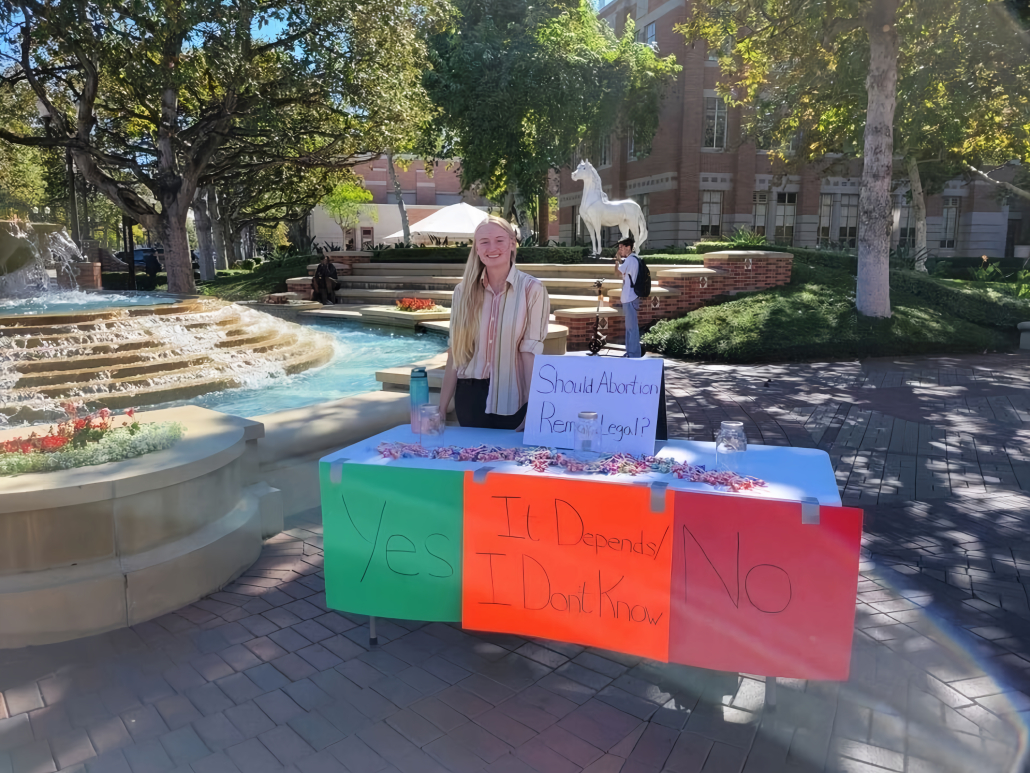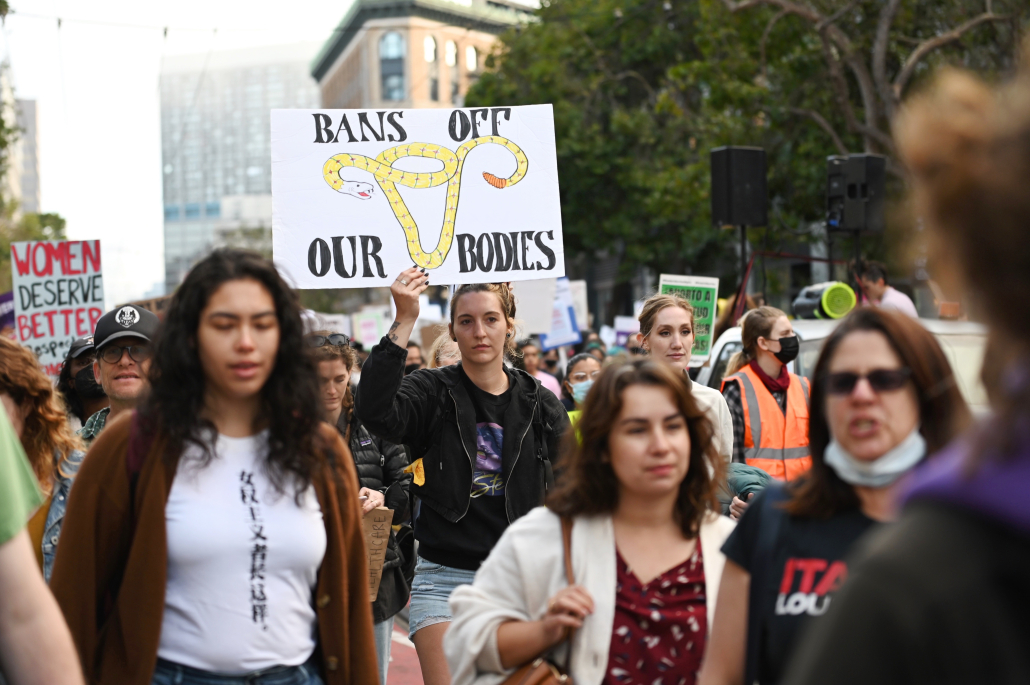USC’s Gen Z on abortion, 50 years after Roe

Every week, Trojans for Life hosts a table on Trousdale Parkway displaying a sign with a simple question: “Should abortion remain legal?” Passersby place a piece of candy in jars above a green “yes” sign, an orange “it depends/I don’t know” sign or a red “no” sign.
“More one-on-one dialogues are going to be more effective at helping both sides understand each other,” said Morgan Farrier, president and co-founder of Trojans for Life — the flagship pro-life student organization at USC — and a junior majoring in astronautical engineering. “We ask … [abortion-rights supporters] to … clarify their views and ask questions to try and understand where they are coming from.”
Throughout the 50 years since the Supreme Court released its Roe v. Wade decision in 1973, conversations about abortion and reproductive rights have been at the forefront of college campus discussions. Anti-abortion students at USC celebrated the Supreme Court’s June 24 decision overturning Roe v. Wade, but they knew that, on a state level, they still had to work overtime to make their views a reality. A University of California, Berkeley poll released August showed 68% of Californians who were eligible to vote disapproved of the overturn, and just under 67% of voters in November supported embedding reproductive rights into the state constitution.
“We’re a very small club,” Farrier said. “We live in California on a college campus, so a lot of students disagree with our opinions. We have a lot of members that are not really comfortable with tabling, or they don’t want to be outed for their views.”
In California, safe abortions remain legal. But Logan Terry, co-director of the Student Assembly for Gender Empowerment, said she does not take these rights for granted and fights to ensure students’ continued access to abortions and related resources. As part of its efforts, SAGE started a series of monthly talks on sexual education in a post-Roe United States, said Terry, a senior majoring in philosophy, politics and law and international relations.
“That has changed a lot of the discussions we have,” Terry said. “Fortunately, in California, we have a lot of reproductive justice, safety nets and options for people. But in other states, that’s not the same, so we are at the heart of that.”
I consider myself to be open-minded about abortion. I’m pretty confident in my pro-life beliefs, but I’m open-minded in the sense that if I’m wrong, I want to know. I want to believe the truth, whatever it is, and so I think a thing that both sides can agree on is that in the pursuit of truth, dialogue is really important.
Rebecca Carlson, a graduate student studying philosophy and dialogues and outreach director at Trojans for Life
SAGE offers a space for students to receive information on reproductive care and reach the nearest abortion clinics, Terry said. Terry’s co-director Celia Bartel and assistant director Emilee LeVeque also make themselves available for one-on-one discussions. Through its speaker events, SAGE highlights the efforts of activists who secure reproductive justice inside and outside of Los Angeles.
“We believe that the overturning of Roe v. Wade was heinous,” Terry said. “People who, historically, are well off financially or able to move from state to state are going to be able to secure abortions [or] birth control, whereas people who are queer, people who are Black, people who are not necessarily identifying as women are going to have a harder time navigating these systems.”
The USC Survivor Support Community provides similar resources and monthly dialogues that specifically address abortion and intimate healthcare for survivors of sexual assault.
“Human rights issues are becoming very political issues,” said Christine Almadjian, director of advocacy at SSC, referring to discussions of abortion. “There is a dichotomy between those two things, and I think that we forget that because we see such polarization between groups of people. … They’re bodily-autonomy issues, and they’re issues that apply to survivors and allies of survivors.”
In an open conversation night held Jan. 25, the week of the 50th anniversary of Roe v. Wade, SSC members discussed legal resources, insurance options, support groups for students and organizations offering compensation for abortions. Opening the event, Almadjian spoke on the importance bodily autonomy holds for survivors.
“[Bodily autonomy] is something that a survivor wants to reclaim. It’s something that they want to have a grasp on again,” said Almadjian, a senior majoring in law, history, and culture. “With Roe v. Wade being overturned, we felt that, as a right, was completely disregarded within the highest law of the land.”

But the term bodily autonomy holds a different connotation in anti-abortion circles: Rebecca Carlson, dialogues and outreach director at Trojans for Life, argues the same standards should apply to fetuses.
“Our country has done an abysmal job of protecting it in many ways, particularly for women and for other minorities over the course of the centuries,” said Carlson, a graduate student studying philosophy, during the club’s “Abortion Dialogues 101” meeting. “As important as bodily autonomy is, it doesn’t extend to the right to kill another innocent person.”
Carlson teaches about both anti-abortion arguments and abortion-rights arguments to give members background information on how to respond to abortion-rights talking points. She said members should hold conversations in a way conducive to productive dialogue instead of making people feel attacked.
Members also conduct these conversations with the understanding that Trojans for Life is a single-issue organization and does not claim any religious or political beliefs. Still, most Trojans for Life members are Christian or Catholic.
“I consider myself to be open-minded about abortion,” Carlson said. “I’m pretty confident in my pro-life beliefs, but I’m open-minded in the sense that if I’m wrong, I want to know. I want to believe the truth, whatever it is, and so I think a thing that both sides can agree on is that in the pursuit of truth, dialogue is really important.”
Even with the intent of a genuine conversation in mind, though, Almadjian said she feels that Trojans for Life’s approach may not come off as intended to passersby.
We believe that the overturning of Roe v. Wade was heinous. People who, historically, are well off financially or able to move from state to state are going to be able to secure abortions [or] birth control, whereas people who are queer, people who are Black, people who are not necessarily identifying as women are going to have a harder time navigating these systems.
Logan Terry, , a senior majoring in philosophy, politics and law and international relations and co-director of the Student Assembly for Gender Empowerment
“I did my best to just try to listen to what they’re saying,” Almadjian said, recounting her own experience speaking with Trojans for Life members at their table. “I haven’t had a negative experience with them … but I can definitely see why it could be triggering for people and why people are apprehensive [about] having that conversation, just like smack in the middle of Trousdale.”
The USC Catholic Caruso Center promotes its own anti-abortion message to congregations: Last semester, the church distributed pamphlets expressing its opposition to Prop 1 — the proposed amendment to enshrine abortion rights in the California constitution — in its pews.
“We want to be caring first and then allow for an inclusive environment, but also at the same time emphasize that these are church teachings,” said Juan Pablo Moreland, missions chair at the CCC and a sophomore majoring in philosophy, politics,, and economics. “We hope to abide by that — and I think there’s a strong, strictly moral case to be made against abortion.”
Anti-abortion organizations are also taking a more head-on approach to their advocacy: Moreland has worked with the CCC to organize anti-abortion marches and send students to One Life LA, an anti-abortion march held yearly in L.os Angeles. Similarly, Trojans for Life crowdfunds to send members to the March for Life in Washington, D.C.
Terry, who herself has organized and attended abortion-rights protests, said the charged environments created by protests and counter-protests made productive discussion more difficult.
“I don’t want to prescribe a general solution, because everybody has to come from a place that’s comfortable for them,” Terry said. “If you have the patience to inform people, then I think that’s a really good thing. But I don’t think we should be expecting every single person to have the space and the patience to want to bring up these … difficult issues with people who fundamentally disagree with them.”

